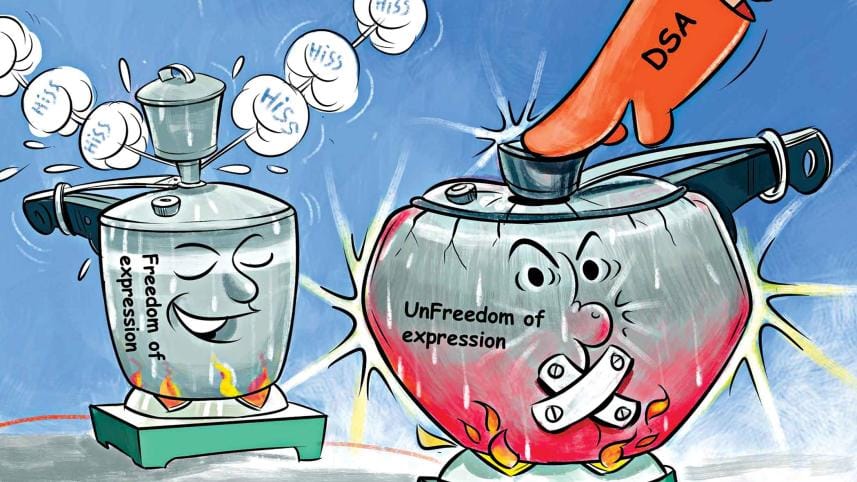Opinion: Hiss or boom?

Hiss!
Steam goes off, lid in the handle slides down to be in airtight mode, and pressure starts to mount again within the sealed pot before the next hiss. At the end of a few hissings, foods are cooked faster than time, with lesser energy burnt. A simple knowledge about "how to manage pressure" led to the invention of pressure cooker by French physicist Denis Papin way back in 1679.
Centuries later, pressure cooker has become the most useful item in every kitchen. Let it hiss, pressure cooker would work fine for you. Choke its hiss, it would go against you by turning itself into a ticking bomb.
Pressure is something no-one likes to manage, yet it is also something that no-one can avoid. One can be a winner or loser depending on how one uses the simple science of managing pressure. And, it either can come through hisses or booms! Hiss is not a pleasant sound to hear. But, bear with it, you're certainly better-off. You're safe actually with the hisses.
Think of any family of ours. Don't we see demonstrations of disagreement, dissatisfaction, difference of opinions or perspectives, and contradictory approaches to situations? We argue, shout, fight and cry over any debatable issue. Together, we make a hiss before settling for a solution.
At a larger scale, a society or state is akin to a giant pressure cooker. It's absurd to have an all-agreeing population within a state. We all are different people, with difference of opinion, ambition and expression. People from different race, religion, age-group, political belief, financial background and school of thoughts make up the 17-crore population of Bangladesh. And, we all have the fundamental right to express ourselves. So, critical voices and dissenting views are only natural for those with power to expect.
Tension, commotion, disagreement and disgruntlement are bound to creep up while a state is being governed. So, the pressure starts to accumulate within the sealed state pot and push up the lid. And, it's time to let the steam go off with a hiss. This is how democracies accommodate dissents, take benefit from those and move on to survive.
But the process of hissing starts to choke in a situation when autocracies reign supreme or democracies slip into a crisis. It's not the case of Bangladesh alone that the health of democracy is not well at all. Look around the world, we would see the recently-defeated Donald Trump in US, Boris Johnson in UK, Vladimir Putin in Russia, Recep Tayyip Erdogan in Turkey, Jair Bolsonaro in Brazil, Xi Jinping in China, Rodrigo Duterte in the Philippines, Hun Sen in Cambodia or Narendra Modi in India. It's not a good time for free media and freedom of expression.
Hissing is a dissent, which is not appreciated by the people in corridors of power. They try to muzzle dissents with all the might they possess. With the help of new laws, technology and excuse of national security and image, they push down the lid on freedom of the press and freedom of expression. And, in the process, they successfully turn the giant state pressure cooker into a ticking bomb: ready to explode any time.
Over a decade, the space for dissent is gradually shrinking and the process of hissing being choked in Bangladesh. Voices from effective opposition political parties are no longer heard either on streets or in the parliament. The free media is made to work its way through a series of obstacles -- the Digital Security Act (DSA), defamation law, Official Secrets Act of 1923, unofficial gag order and the constant fear of being picked-up, before capturing the sound of hissing for the people. The traditionally-strong cultural or social activism lost its cause. The once-vibrant civil society chose to be mostly silent for fear of tongue-lashing from people in power or from lickers of their sandals.
True, there are some hisses that we still could hear in the social media space. Understandably, louder among the hisses come farther from Bangladesh, in the safety away from home. Within Bangladesh, social space users could realise by now that their freedom of expression may land them in jail without bail. The fate of Mushtaq Ahmed will now remain burnt in their brains, forever.
Picked up under DSA for barely letting out a hiss at government's handling of pandemic, the celebrated crocodile entrepreneur-turned-writer died in jail Thursday. In the last nine months in prison, the bohemian visionary might have expected the government to respect his freedom of expression or the legal system, despite having been denied bail six times, to come forward for upholding his right to express himself.
Mushtaq is now beyond justice and making any hiss. Picked up along with Mushtaq on similar charge of hissing in the social media, cartoonist Ahmed Kabir Kishore is now seriously ill and languishing in jail. A healthy photojournalist, Shafiqul Islam Kajol, has found himself reduced to a crippled old man following his 53 days of quizzical disappearance and 237 days in jail.
With the sole bread-earner restricted mostly to bed, his family is now being forced to run around the corridors of court for the trial of a case filed under DSA.
With every such injustice and every such muzzling of dissent, pressure continues to build up within the "Cooker Bangladesh". Let it hiss, before it's too late for a hiss.




 For all latest news, follow The Daily Star's Google News channel.
For all latest news, follow The Daily Star's Google News channel.
Comments